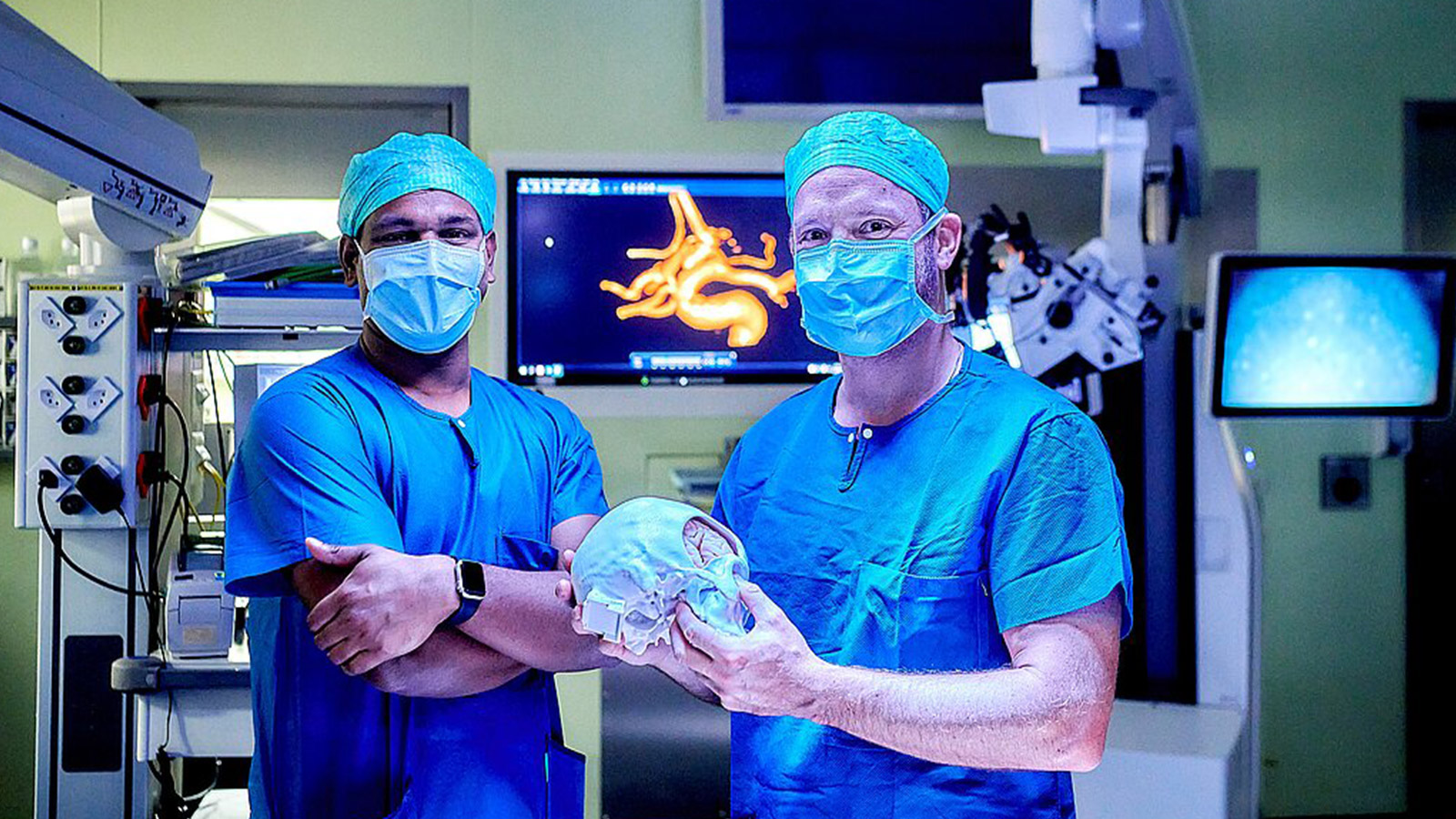Aneurysm surgery is one of the most delicate procedures in neurosurgery. Choosing the type of procedure, planning the route, and operating on the blood vessel place the highest demands on surgeons. A new 4D simulator developed at Inselspital, Bern University Hospital, and the ARTORG Center, University of Bern, allows the procedure to be planned, tested, and optimized on an exact 4D model, including the patient's blood, blood vessels, and pulse. This further improves patient safety during aneurysm surgery.
Approximately 2 out of 100 adults have aneurysms, balloon-like dilations of brain arteries, very often without noticing anything. Depending on their size and stability, there is a risk that an aneurysm will rupture and cause a brain hemorrhage.
The neurosurgical removal of brain aneurysms is extremely challenging due to their location and characteristics. Careful consideration of the risk of rupture versus the risks of surgery is necessary. Although errors during surgery are rare, they can have far-reaching consequences. Minimizing the risks of surgery is therefore a top priority.
4D simulator allows practice using real-life cases
A team of specialists from the Department of Neurosurgery and Interventional Neuroradiology at Inselspital, Bern University Hospital, has collaborated with the ARTORG Center at the University of Bern to develop a completely new, comprehensive and multi-award-winning 4D simulation system for training clipping (clamping an aneurysm) and coiling (filling an aneurysm).
The simulator offers realistic visual and haptic training opportunities on a 3D-printed replica of the patient's skull, brain, and, now, blood vessels. The addition of 4D simulation, which correctly simulates the temporal aspects by including the pulse and blood flow in the blood vessels, is unique worldwide.
The 4D simulator is used both for planning the procedure and for real-time exercises on specific cases. Thanks to the largely perfected planning and practice, risks due to complications can be further reduced.
Informing patients using a 4D model of their own head
Brain surgery has a significant emotional component for patients. A positive attitude and the alleviation of fears also contribute to the success of a procedure. The newly developed 4D simulator opens up completely new possibilities in this regard by allowing the physician to show and explain the procedure, the approach, and the specific steps on a 1:1 scale, thereby positively supporting the patient's motivation.
Training and measurable efficiency thanks to 4D simulator
The 4D simulator offers new dimensions in training and continuing education for neurosurgical and neuroradiological specialists. Doctors can work on the 4D simulator both during their specialist training and in later in-depth expert courses, gaining completely new experiences. In the context of training, this is complemented by the possibility of quantifying and comparing the performance of surgeons with one another.
Further development with the help of AI – robotics as a long-term goal
Neurosurgeon Dr. David Bervini and biomechanical engineer and PhD student Fredrick Johnson Joseph (biomechanical engineer) are in the process of founding the start-up company SurgeonsLab. This dynamic company will take over the production and further development of the 4D simulator and develop innovations and services in brain surgery. The two founders can rely on a top team of supporters, including Prof. Andreas Raabe and Prof. Stefan Weber. Future developments will incorporate artificial intelligence (AI) and robotics.
Related News
- Associate professorship for David Bervini20.02.24 - We congratulate our Attending Physician in Neurosurgery, Prof. David Bervini, MD, who has been appointed Associate Professor at the University of…
- Surgical training on the aneurysm simulator09.02.24 - Making sure every move is right: the 2nd Bern Workshop for Aneurysm Surgery (May 14/15) will simulate and train the demanding operation.
- Hands-on: aneurysm surgery on the simulator13.03.23 - Aneurysm surgery is challenging. This makes it all the more important to get every move right. This could be practiced at the First Aneurysm…
- Award for Inselspital ARTORG spin-off06.04.20 - Dr. David Bervini and Fredrick Johnson Joseph are being awarded CHF 10,000 by Venture Kick for their work on the 4D patient simulator.
Related Links
- Information about aneurysms of a cerebral artery
- SurgeonsLabChanging tomorrow's approach of surgeries and clinical interventions
- YpsomedIn January 2021, the Innovation Award jury awarded the first prize of CHF 50,000 to SurgeonsLab.
- Venture KickStartups developing mini-cryostats, a cell level ophthalmology, optical quantum sensors and 4D microsurgical patient simulator each win CHF 10’000
- Swiss Heart Foundation

